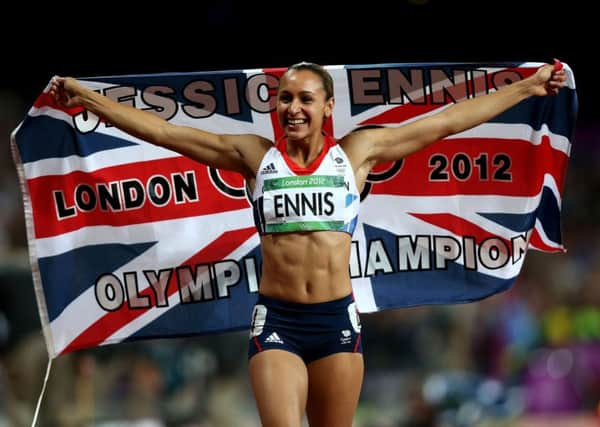The day Jessica Ennis became GB's golden girl


There have been some arresting sporting contributions by women in a British vest, but none were aligned as beautifully as this, at the greatest sporting pageant on earth before a passionate home crowd.
Dame Kelly Holmes crossing the line to take 1500 metres glory in Athens is right up there, eyes on stalks, arms akimbo in utter disbelief at becoming only the third woman in history to win gold at that distance and the 800m at the same Olympic Games.
Advertisement
Hide AdAdvertisement
Hide AdDame Mary Peters’ Olympic gold in the pentathlon in 1972 at Munich was sandwiched between Commonwealth success in 1970 and 1974, a period when she was just as dominant as Ennis-Hill at her formidable peak.
Mary Rand returned gold, silver and bronze in 1964 at Tokyo in long jump, pentathlon and 4x100m relay respectively. Her friend and room-mate Ann Packer came home with 800m gold from Tokyo, but acknowledged that her achievement was a mere footnote to the performance of an athlete she described as the greatest there has ever been or might ever be.
Indeed had Rand blazed across the early 21st century instead of the middle part of the 20th her elfin blonde looks would have made her the totem that Ennis-Hill has become. The Tokyo Games occurred before the Olympics became a mainstream broadcast event. There are too few celluloid notes of the Rand athletic canon recorded for posterity.
Ennis-Hill is thus way more than the sum of her medals. She occupies an emotional place in our recollections, representing something broader than the mere fact of becoming the best heptathlete in the world, as deserving as that might be.
The pull of that incredible Saturday night was so powerful, its significance so deep that its imprint will live on in the memories of those lucky enough to be in the stadium and the millions who bore witness at home, or on the move. I have vivid recall of the mood on the train home that night, of people who had never met communing around smart phones to share the highlights reel at Euston. This stuff never leaves you.
The appeal of Ennis-Hill, already without blemish, grew in motherhood. She came back after the birth of son, Reggie, in 2014, battled injury and gave it one more crack at Olympic gold. She might have had three were it not for the injuries that kept her out of Beijing and dogged her preparation for Rio.
I’m guessing she would not trade that golden moment in London for success in China and Brazil. As it was she came home with silver in August, beaten by a Belgian athlete, Nafissatou Thiam, who performed like never before, yielding personal bests in five of the seven disciplines, to deny her.
She also leaves with two world titles, the first in 2009, letting the world know what might have been 12 months earlier had she been fit enough to contest the Beijing Games, and the second in 2015 just a year into motherhood.
Advertisement
Hide AdAdvertisement
Hide AdAn Achilles injury kept her out of the indoor season, returning to competition only at the end of May. Though eclipsed in Rio, silver was met not with disappointment but joy, for it was the result of her very best effort. She never gave anything less.
A month down the line she might have been in good enough shape for gold. That’s sport.
There were no complaints from her, which is just as it should be.